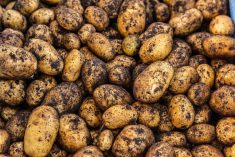New provincial regulations for small potato growers will jeopardize the ability of farmers’ markets to operate year round in Manitoba, opponents say.
The new rules make it illegal for a farmers’ market to sell seasonally grown local potatoes after Oct. 31.
That could threaten plans for a year-round farmers’ market in downtown Winnipeg. It could also shut down groups in other Manitoba cities that currently sell local potatoes during the winter months, according to a coalition formed to fight the regulations.
“We would like to let the public know that this is affecting their choices of what they can purchase over the winter,” said Dianna Mae Hocaluk, executive director of the Farmers’ Markets Association of Manitoba.
Read Also

Mazergroup’s Bob Mazer dies
Mazergroup’s Bob Mazer, who helped grow his family’s company into a string of farm equipment dealerships and the main dealer for New Holland machinery in Saskatchewan and Manitoba, died July 6 from cancer.
The regulations under the Farm Products Marketing Act bring farmers’ markets, roadside stands and small potato growers under the authority of Peak of the Market. They must now register with the provincial vegetable-marketing board, although permits are optional until 2013.
Small growers with fewer than five acres of “freshly dug” potatoes may sell directly to farmers’ markets and roadside stands without going through Peak of the Market. But they may only sell during the current season. After Oct. 31, unsold potatoes must be donated to a food bank.
That means farmers’ markets in Brandon and Portage la Prairie, which sell potatoes at local malls during the winter, will technically be illegal, said Hocaluk.
“That would mean we could not sell any local stored product over the winter.”
FMAM has joined forces with small growers and independent grocers to fight the restrictions. Trevor Schreimer, a coalition spokesperson, said the group plans to meet with Peak to appeal for more flexibility.
If members don’t receive satisfaction, they will appeal to the Farmer Products Marketing Council, a provincial regulator, Schreimer said.
The controversy comes after FMAM last year received $450,000 in federal funding to improve the 31 farmers’ market sites in Manitoba.
SITE STUDY
FMAM is developing a feasibility study into a permanent farmers’ market at a vacant site on Waterfront Drive in downtown Winnipeg.
Hocaluk said a mall in Selkirk, where FMAM has its office, has also expressed interest in hosting a winter farmers’ market.
All of that could be at risk because of the new regulations, said Jennifer Morrison, FMAM chair.
“I’m sure they would be very concerned about these restrictions, just as we are, and the implications for their markets,” Morrison said.
Even if they can’t sell their own potatoes during the winter, year-round farmers’ markets could always sell spuds from Peak of the Market. But Hocaluk said that defeats the whole purpose of a farmers’ market.
“The idea of a farmers’ market is to buy directly from the farmer. The farmers at our markets are our members and Peak is not a member.”
FMAM is concerned that another forthcoming regulation will similarly restrict its members’ ability to sell other root crops.
Carrots, parsnips, rutabagas and pickling onions are also regulated vegetables in Manitoba, as well as potatoes. Previously, those crops were treated as exempt from Peak’s authority if produced from an acre of land or less. Potatoes were exempted under a four-acre rule.
But those rules were eliminated in 2009, along with a legal definition for direct consumer sales. Peak says it will draft a regulation for other root crops, using the potato regulation as a template.
That could mean the end for year-round farmers’ markets in Manitoba, since they sell locally grown vegetables that can be stored over winter, FMAM says. [email protected]


















